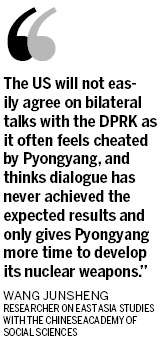Pyongyang calls for talks with Washington

Pyongyang proposed high-level talks with Washington on Sunday to ease tensions on the Korean Peninsula, albeit with conditions analysts say the United States is unlikely to accept.
"Unless the Democratic People's Republic of Korea makes a concrete commitment or action toward denuclearization, the US is unlikely to have bilateral dialogue with the DPRK just because of such an offer," said Wang Junsheng, a researcher on East Asia studies with the Chinese Academy of Social Sciences.
The DPRK's National Defense Commission said in a statement on Sunday that Washington can pick a date and place for talks and the two countries can discuss a range of issues, but no preconditions should be attached.
Pyongyang's proposal came just a few days after it canceled a high-level meeting with the Republic of Korea scheduled for Wednesday and Thursday due to a disagreement over who would lead the two delegations.
Tension has been high on the Korean Peninsula since the DPRK carried out its third nuclear test in February, followed by threats of nuclear attacks on Seoul and Washington.
"The legitimate status of the (DPRK) as a nuclear weapons state will go on (until) the nuclear threats from outside are put to a final end," Pyongyang said in the statement, urging the US to cease all sanctions against it.
Washington will only engage in "real" talks with Pyongyang, and any talks "have to be based on them living up to their obligations" on proliferation, nuclear weapons, smuggling and other issues, White House Chief of Staff Denis McDonough told CBS News's Face the Nation, Agence France-Presse reported.
"All Pyongyang's provocations since February have failed to force the US to talk with it, so it now turns to a public offer of talks with Washington," said Wang from the Chinese Academy of Social Sciences.
He said Pyongyang's latest offer reflects a consistent priority in its foreign policy, which is to develop relations with the US.
"The US will not easily agree on bilateral talks with the DPRK as it often feels cheated by Pyongyang, and thinks dialogue has never achieved the expected results and only gives Pyongyang more time to develop its nuclear weapons," Wang said.
Jin Canrong, deputy head of the International Studies College of China's Renmin University, said Pyongyang's offer is "a good gesture but its conditions are totally against the US' call for its denuclearization first".
Obama is occupied with domestic issues and has no faith in Pyongyang's credibility, he added.
During a meeting between President Xi Jinping and Obama earlier this month in the US, the two leaders agreed that the DPRK must give up its nuclear arsenal, according to Agence France-Presse.
ROK President Park Geun-hye will visit China and meet with Xi on June 27.
According to ROK's Yonhap News Agency, the DPRK's leader Kim Jong-un called for stronger relations with China in a birthday message to Xi on Saturday.
"It is the unshakable will of our party and people to further consolidate and develop generation after generation of the traditional DPRK-China friendship ... from a long-term and strategic viewpoint despite the complicated international situation," Kim said.
Wang from the Chinese Academy of Social Sciences said it has been a tradition that the two countries' leaders send each other messages on important occasions. "Kim's message has a positive effect on improving bilateral relations," he said.
chengguangjin@chinadaily.com.cn
(China Daily 06/17/2013 page11)








